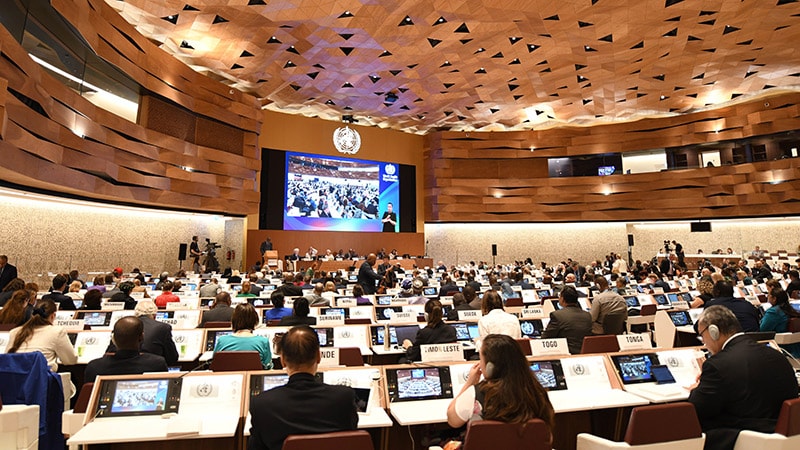On Saturday, May 24, the 78th World Health Assembly (WHA) voted to adopt a resolution to establish a global framework to support the diagnosis and management of rare diseases and promote research in the field. Sponsored by more than 20 countries led by Egypt and Spain, the resolution comes as the culmination of a decade of advocacy by the rare disease community.
“We see this as a practical step forward; one that recognizes existing gaps and commits member states and the World Health Organization to stronger coordination and inclusive action,” said Her Excellency Hanan Al Kuwari, PhD, advisor to the Prime Minister of Qatar for Public Health Affairs, at a side event of the WHA organized by Rare Diseases International and co-hosted by Medscape and other organizations.
Although most rare diseases are genetic, there are also rare autoimmune diseases, metabolic diseases, infectious diseases, and cancers. Each rare disease is uncommon alone, but when taken together they afflict about 300 million people globally.
The individual rarity of the diseases means that they present a common challenge to health systems, which aren’t prepared to address such uncommon cases. They can take a long time to diagnose, even in rich countries. In Europe, it takes an average of 4 years to diagnose a known rare disease. Once diagnosed, it can be difficult to get treatment because of a lack of specialized equipment and expertise, and existing drug treatments are expensive. These problems are amplified in poorer countries, where healthcare systems have access to fewer resources.
The resolution tasks the World Health Organization (WHO) director general with developing a 10-year global action plan to tackle rare diseases. The plan should foster equitable access to diagnosis and treatment, as well as support research and monitoring of rare diseases. The resolution also calls for the director general to identify centers of excellence around the world for clinical work on rare disease groups. A draft global action plan should be prepared for consideration by the 81st World Health Assembly in 3 years.
“The global action plan will give structure, coherence, and momentum to a cause that, for too long, has been fragmented and underfunded,” said Mohamed Hassany, MD, Egypt’s assistant minister of health for projects and public health initiatives, at the WHA side event.
The Building Blocks of Change
“This is a huge and important step forward for the recognition of rare and low-prevalence diseases as a major public health need,” said Claudia Gonzaga-Jauregui, PhD, a geneticist at the National Autonomous University of Mexico and a founder of the Collaborative for Rare Diseases in the Caribbean and Latin America (CEPCAL). But change will take time, she told Medscape Medical News.
“Proper implementation of the resolution will take advocacy, changes in current legislation, or new legislation and regulatory frameworks in most countries, as well as development of national health plans,” she said.
The resolution will help advocacy efforts in countries that have so far ignored rare diseases or put them low on their healthcare agenda. Gonzaga-Jauregui hopes that, in the mid- to long-term, the global action plan will put pressure on local and national governments to develop a rare disease agenda.
Developing a framework for rare diseases won’t only help the people living with rare diseases. Many advocates argue that it is a path to equitable, universal healthcare. “If you get it right for the rare disease community, all healthcare systems will benefit,” said Kelly du Plessis, the founder and CEO of Rare Diseases South Africa, while hosting a panel at the WHA side event.
EURORDIS-Rare Diseases Europe, which wasn’t involved in the WHA side event, called the adoption of the resolution a historic moment. “It sends a powerful and meaningful signal to policymakers the world over that the health and inclusion of the 300 million people living with a rare disease are now recognized as global priorities. The resolution reinforces the understanding that addressing rare diseases is essential to achieving universal health coverage and to building equitable, people-centered health systems,” Virginie Bros-Facer, CEO of EURORDIS, told Medscape Medical News.
“We commend the leadership of Spain, Egypt, and all co-sponsoring countries, and we thank the WHO for recognizing the challenges faced by people living with a rare or undiagnosed disease,” she added. “EURORDIS stands ready to help shape and implement the Global Action Plan this resolution mandates. Our global community should be proud today, even if the world we want to achieve still lies far ahead.”
Gonzaga-Jauregui and Bros-Facer reported no relevant financial relationships.
Source link : https://www.medscape.com/viewarticle/world-health-assembly-adopts-rare-disease-resolution-2025a1000dbb?src=rss
Author :
Publish date : 2025-05-27 12:49:00
Copyright for syndicated content belongs to the linked Source.
